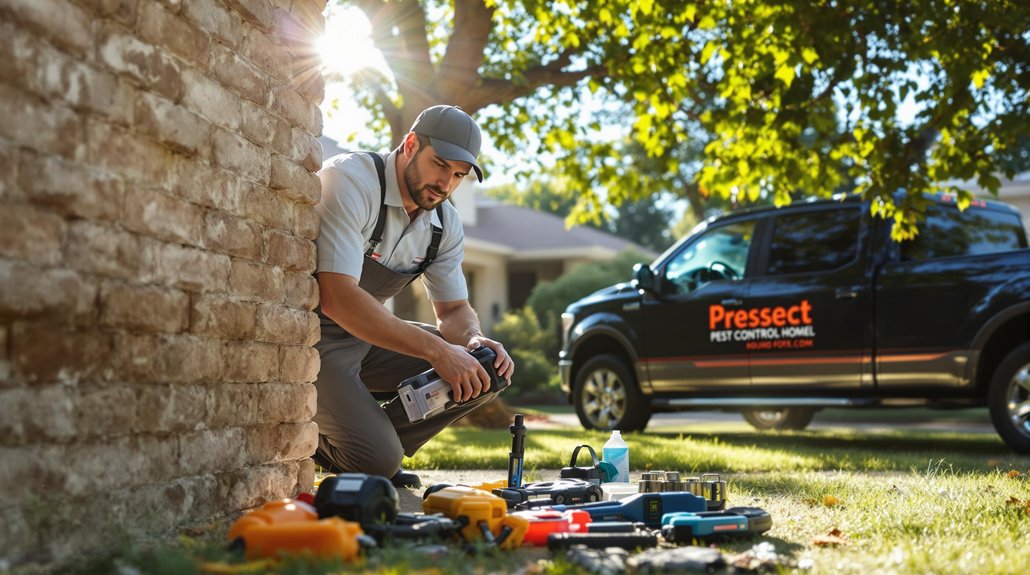
The duration of a pest control job in Round Rock, TX, varies based on the type of pest and the severity of the infestation. Simple treatments, like ant control, may take 1-2 hours. In contrast, more complex situations, like rodent or termite control, typically require multiple visits or longer timeframes. Factors such as treatment methods and pest behavior also play a role in time needed. Keep exploring to find out more about the pest control process and tips for preparation.
Key Article Highlights
- The duration of a pest control job varies based on the type of pest being treated, affecting the overall time required.
- Severity of the infestation plays a crucial role; more severe infestations typically need additional treatments and longer service times.
- Initial treatments for common pests like ants take about 1-2 hours, while rodent control may require 1-3 visits.
- Treatment methods, including chemical applications and eco-friendly approaches, can also influence how long the job takes.
- Follow-up treatments are essential for complete pest eradication, with timing based on the initial treatment results and pest type.
Understanding Pest Control Services in Round Rock
What makes pest control services crucial in Round Rock? Pest control services are critical for maintaining a healthy environment. They help manage and eliminate unwanted pests that can harm homes and health. These services use various pest control techniques to address different infestations. Common methods include traps, baits, and sprays that target specific pests. Additionally, pest prevention strategies are key to stopping future issues. This includes sealing entry points, reducing standing water, and maintaining cleanliness. By employing these strategies, residents can protect their homes and families from pests. Effective pest control services guarantee safety and comfort in living spaces. Furthermore, integrated pest management is an essential approach that combines multiple techniques for effective results. For successful outcomes, pest control in Round Rock often utilizes residual sprays and bait stations to combat infestations. Overall, understanding these services is essential for anyone living in Round Rock. Furthermore, routine inspections and seasonal adjustments are vital components of an effective pest control plan.
Factors That Impact the Duration of Pest Control Jobs
Several factors can affect how long pest control jobs take. The type of pest, the severity of the infestation, and the treatment method used all play a role. Understanding these factors can help in estimating the duration of the job. For instance, bed bug control often requires multiple treatments and follow-up treatments to ensure all hidden infestations are eliminated.
Type of Pest
The type of pest greatly influences the duration of pest control jobs. Different pests require different approaches, affecting how long the job will take. For example, ants may need quicker treatment compared to termites, which require detailed pest identification techniques. Pest behavior analysis also plays a role. Some pests are more active at certain times, requiring technicians to adjust their plans. Rodents may take longer to control due to their hiding skills. Pests like cockroaches can be challenging because they reproduce quickly. Each type of pest presents unique challenges that can extend or shorten the job duration. Understanding these differences helps pest control professionals estimate the time needed for effective treatment.
Severity of Infestation
Severity of infestation plays a crucial role in determining how long pest control jobs last. An effective infestation assessment is necessary for understanding the extent of the problem. When a pest control expert arrives, they begin with pest identification to determine the type and number of pests present. A mild infestation may require just one treatment session, resulting in a shorter job duration. In contrast, a severe infestation often demands multiple visits and more time to guarantee complete eradication. The overall complexity of the situation, including hidden nests or widespread damage, can also extend the job length. Therefore, the severity of the infestation greatly impacts how long the pest control process takes to resolve the issue successfully.
Treatment Method Used
Different treatment methods can greatly influence how long pest control jobs take. There are two main types of methods: chemical applications and eco-friendly methods. Chemical applications may work faster but often require more time for safety measures and follow-up treatments. Eco-friendly methods tend to be slower as they focus on natural solutions, which may take longer to show results.
| Treatment Method | Duration Impact |
|---|---|
| Chemical Applications | Generally faster |
| Eco-Friendly Methods | Usually slower |
| Combination Approach | Varies by situation |
| Follow-Up Treatments | Important for both |
Each method has its advantages and drawbacks. Understanding these factors helps clients set realistic expectations for the duration of pest control jobs.
Common Types of Pests and Their Treatment Times
Ants and rodents are common pests that many people face. Each type requires different treatment times to be effective. Understanding these timelines can help homeowners plan for pest control services. Effective strategies for rodent control include exclusion repairs, bait stations, trapping, and sanitation recommendations to prevent access and eliminate activity. Additionally, liquid soil treatments are essential for controlling termite populations that can also affect homes. Flea, tick, and chigger control can also be important, and it typically involves insect growth regulators and targeted treatments for optimal results.
Ant Treatment Duration
When dealing with ant infestations, understanding the treatment duration is vital for effective pest control. Ant treatment can vary based on the type of ant and the size of the infestation. Ant behavior plays a significant role in this process. Some species, like carpenter ants, may require longer treatment times due to their large colonies. Typically, initial treatments can take one to two hours, while follow-up visits may be necessary over several weeks. The goal is to eliminate the queen and disrupt the colony’s structure. Homeowners should be patient, as complete eradication may take time. Proper treatment guarantees that ant colonies do not return, ultimately leading to a pest-free environment.
Rodent Control Timeline
How long does it take to control a rodent problem? The time needed for rodent control can vary. Typically, it takes about one to three visits from a pest control expert. This depends on the severity of the infestation. Understanding rodent behavior is vital. Rodents can be tricky and often hide in walls or attics. Control techniques include trapping and baiting. These methods can effectively reduce the rodent population. The first visit usually focuses on inspection and identifying entry points. After that, follow-up visits are necessary to monitor progress and guarantee success. Homeowners should remain patient, as complete control may take weeks. Ultimately, a consistent approach is key to eliminating rodents effectively and preventing future problems.
The Pest Control Process: What to Expect

While pests can be a nuisance, understanding the pest control process can help homeowners prepare for treatment. The process typically involves several key steps, each designed to address the pest issue effectively.
- Inspection: A thorough examination of the home identifies pest problems and entry points.
- Assessment: Pest control technicians evaluate the situation and recommend suitable pest control techniques.
- Treatment: The chosen methods are applied to eliminate pests and their nests.
- Prevention: Implementation of pest prevention strategies helps to avoid future infestations. Effective strategies for mosquito control include barrier sprays and standing water management.
Homeowners should be aware of these steps to better understand the time and effort involved in pest control. This knowledge empowers them to maintain a pest-free environment.
Follow-Up Treatments and Their Timeframes
What can homeowners expect from follow-up treatments in pest control? Follow-up treatments are essential for maintaining a pest-free environment. They help guarantee that pests do not return after the initial treatment. The frequency of these treatments can vary based on the pest type and severity of the infestation.
| Treatment Type | Frequency |
|---|---|
| General Pest Control | Every 3 months |
| Termite Treatments | Every 6 months |
| Rodent Control | Monthly |
| Bed Bug Treatments | Every 2 weeks |
Homeowners should discuss their specific needs with pest control professionals. This dialogue will help determine the best approach and timeframes for follow up treatments. Regular treatments enhance effectiveness and peace of mind.
Preparing Your Home for Pest Control Services

Preparing a home for pest control services is important for guaranteeing the effectiveness of treatments. Proper home preparation can help prevent pests and enhance the results of the service. Here are some pest prevention tips to follow:
Effective home preparation is crucial for successful pest control treatments and long-lasting pest management.
- Clear Clutter: Remove items from floors and surfaces to provide easy access for technicians.
- Seal Food: Store food in airtight containers to prevent contamination.
- Remove Pets: Keep pets in a safe place away from treatment areas during the service.
- Inform Technicians: Share any known pest problems or areas of concern with the pest control team.
These steps will guarantee a smoother process and better results in pest control efforts. Effective home preparation is key to long-lasting pest management.
Tips for Minimizing Future Pest Infestations
To minimize future pest infestations, homeowners should take proactive steps to maintain their living spaces. Implementing preventive measures is essential for keeping pests away. Regular inspections can help identify potential problems before they escalate.
| Preventive Measures | Benefits |
|---|---|
| Keep food stored safely | Reduces food sources for pests |
| Seal entry points | Prevents pest access |
| Maintain cleanliness | Discourages pests |
| Dispose of waste properly | Limits nesting areas |
Frequently Asked Questions
Can I Schedule Pest Control During Weekends or Holidays?
Many pest control services offer weekend scheduling and holiday availability. Customers can often choose these options to fit their busy lives. It’s advisable to contact local providers for specific details on their schedules and services.
Do I Need to Leave My Home During Treatment?
During pest control treatments, it is often recommended to leave the home for safety. Treatment duration can vary, and taking pest control precautions helps guarantee the effectiveness of the process and the safety of residents.
Are Pest Control Treatments Safe for Pets?
Pest control treatments can be as safe for pets as a cozy blanket on a cold day. However, pet precautions are essential. Homeowners should prioritize pest safety to guarantee their furry friends remain unharmed.
How Often Should I Schedule Pest Control Services?
Scheduling pest control services depends on pest frequency and service timing. Regular treatments every few months often help maintain a pest-free environment. Homeowners should assess their specific needs to determine the best schedule for their situation.
What Should I Do if Pests Return After Treatment?
What if pests return after treatment? One might wonder about their persistent nature. Observing pest behavior and evaluating treatment effectiveness are essential. Reexamine the situation, consult professionals, and consider additional treatments to guarantee lasting relief.
Call today if you are in need of a pest exterminator in Round Rock, TX!
(512) 254-8185

